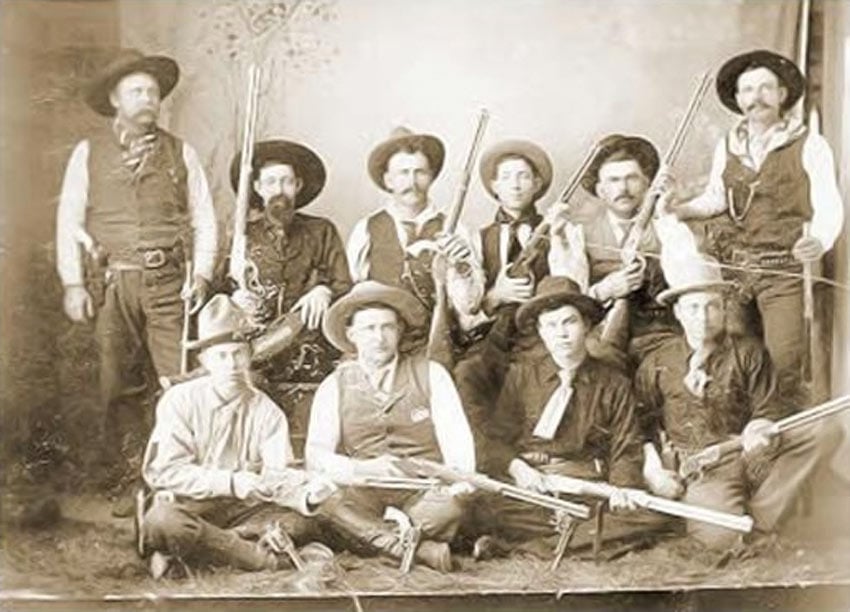
Excluding the baseball team, Chuck Norris and the masked vigilante who rode a horse named Silver, the Texas Rangers certainly have had a storied past. What began as a group of individuals hired to protect early settlers from attacks, the Rangers eventually grew to become the oldest law enforcement agency in North America with statewide jurisdiction. In terms of name recognition, they’re as well known as other world-famous agencies such as Scotland Yard and Interpol.
These weren’t soldiers or militia, but men that actually “ranged” the land to protect those in danger. There are obviously lessons to be learned from men that leave their families to come to the aid of others and the example the Texas Rangers set forth is no different.
Lessons to be Learned
Be able to handle any situation without definite instructions.
You don’t always have the luxury of asking if you don’t know something, so knowing how to think ahead and use common sense is vital to taking care of a circumstance when actions are required right away. “A Ranger is an officer who is able to handle any given situation without definite instructions from his commanding officer or higher authority. This ability must be proven before a man becomes a Ranger.” – Ranger Captain Bob Crowder
Don’t hoot-n-holler, have moral discipline and courage.
This lesson can obviously be related to the term “silent professionals” in some way. “In his memoirs, John S. ‘Rip’ Ford later described the kind of men who served under him as Rangers: A large proportion…were unmarried. A few of them drank intoxicating liquors. Still, it was a company of sober and brave men. They knew their duty and they did it. While in a town they made no braggadocio demonstration. They did not gallop through the streets, shoot, and yell. They had a specie of moral discipline which developed moral courage. They did right because it was right.” – Texas DPS
Stand up for what’s right, even when outnumbered.
As with any good story, the truth may be stretched here and there, but the lesson remains the same. The story of “One Riot, One Ranger” goes all the way back to an illegal heavyweight prize fight in 1896. The governor of Dallas met Captain Bill McDonald at the train station and asked why he was the only Ranger present and where the other lawmen were. McDonald replied: “Hell! Ain’t I enough? There’s only one prize-fight!” While some records show that many Rangers were in attendance of the fight, the Ranger code is exhibited in McDonald’s remark. A difference can often be made with just one, strong willed individual.
Press on when the going get’s tough.
No matter what you’re chasing, you’ll never catch it if you give up. Rangers understood this and also knew that the mission at hand was more important than themselves and their comfort. The Apache people “dreaded the Texas Rangers…whose guns were always loaded and whose aim was unerring; they slept in the saddle and ate while they rode, or done without…when they took up our trail they followed it determinedly and doggedly day and night.”- Herman Lehmann
Be better than you were yesterday.
Self growth is much more important than simple competition with those around you. You often know exactly what you need to do to advance yourself and usually all it takes is hard work. In reference to the Texas Rangers, author and historian Walter Prescott Webb said, “they are what they are because their enemies have been what they were. The Rangers had to be superior to survive. Their enemies were pretty good…(the Rangers) had to be better…”
Learn new skills.
Known for their expertise in combat, horsemanship and tracking, Texas Rangers were constantly learning new new skills and finding ways to utilize them. The Rangers knew that the world is an ever changing landscape and that new ideas and equipment must be mastered to keep from getting left behind in modern times. Knowledge doesn’t weigh anything and only requires time and dedication. If Rangers simply rested on their laurels, they would’ve been overrun by their adversaries.
Maintain and take pride in your equipment.
Sometimes you can’t afford top-of-the-line gear, but that doesn’t mean you should neglect it. Aside from requiring the essentials, the Rangers knew that it was imperative they take good care of their belongings. “Men, upon entering the service, are required to procure a good outfit consisting of horse, saddle, Winchester, six-shooter, rope, and bedding. It shall be maintained in good order continuously as long as they remain in the service.” Strive to attain quality, well made gear and keep it ready for action.
Do your share of the workload.
Nothing is more inefficient (and irritating) than going on a camping trip with someone who doesn’t offer to help with the various campsite chores. Do what’s required, but also help others if they need it. “Each Ranger is required to perform his full amount of camp duty, such as cooking, herding horses and any and all of the regular routine camp work. This must be strictly observed and any complaint substantiated shall be sufficient grounds for a dismissal from the service.”
Never stop pursuing what is just and proper.
As an inductee of the Texas Ranger Hall of Fame, Captain William Jesse McDonald is known as one of the greatest Captains in Ranger history. He even briefly worked as a bodyguard for Theodore Roosevelt, Woodrow Wilson and William Howard Taft. On his tombstone is etched his motto, “No man in the wrong can stand up against a fellow that’s in the right and keeps on a-comin.” Don’t ever give up on what you know is right.
These are just some of the values and lessons to be learned by the Texas Rangers. We would all be a little better off if we kept these in mind as we performed our daily duties. If you live your life by a code, what are the values that you strive for?
Sources: